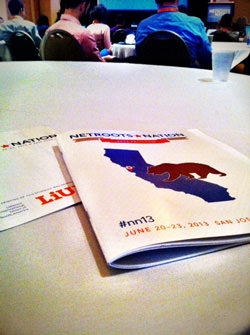Getting Back to Netroots
Online activism is just part of the fabric of political communication now, used for recruiting, fundraising and organizing, but there was some tension at last month's Netroots conference between streets and screens.Online activism is just part of the fabric of political communication now, used for recruiting, fundraising and organizing, but there was some tension at the Netroots conference between streets and screens.
Sometimes online activists, who spend a lot of their time in front of screens, get worn down and long for some face-to-face contact with colleagues they may know only through tweets, timelines on Facebook and photos on Instagram. Netroots Nation, the annual conference for progressive activists, provides that connection, says Raven Brooks, Netroots’ executive director.
“Doing this as a passion or professionally can be a grind,” Brooks said. “It’s a lot of hard work, and it’s important to recharge and meet some people and get ready to take it up to the next level.”
This year’s conference, the eighth, was held June 20-23 in San Jose, Calif. There were training sessions on “How to Leverage Video for Your Cause” and “Intro to Legislative Advocacy,” panels on topics such as “The Future of Organizing” and keynotes addressing immigration and gun violence. The numbers of attendees has grown every year, and this time there were around 3,000.
Brooks volunteered at the first conference, held in Las Vegas in 2006. About 800 participants came to what was then called the Yearly Kos, inspired by Markos Moulitsas’ influential political blog Daily Kos.
Brooks sees Netroots as a place to offer training by experts and connect people and issues that otherwise wouldn’t come together.
“A real passion of ours is the immigration issue,” Brooks said. “We’ve played a role in elevating people like the DREAM activists, so everyone at the conference is hearing their stories, and now you have multi-issue groups, including some that totally avoided immigration, talking about it. We’ve created panels with different groups of people and different interests to force them to be in a room together.”
Online activism is just part of the fabric of political communication now, Brooks said, used for recruiting, fundraising and organizing, but there was some tension at Netroots between streets and screens.
Brian Smith, a campaign manager with Earthjustice who has worked in the field for 15 years, says he feels ambivalent about organizing online.
“Like everyone else, I’m concerned about slacktivism and whether likes on a Facebook page mean anyone is changing the world,” he said. “What was once called activism was getting out in the street to make change, and for the new generation activism is what happens online. I’m not convinced that’s enough.”
John Becker, managing editor of The Bilerico Project, which bills itself as the Web’s largest LGBTQ group blog, says social media can help get people out in the streets to make change.
Becker said he saw that with people coming to demonstrations against Proposition 8, the California initiative that banned same-sex marriage. Becker helped start an online petition that got venues to cancel tour dates for Michelle Shocked after the singer made what some people interpreted as anti-gay remarks in San Francisco in March.
“My generation, millennials, are the most digitally plugged in and engaged in social media,” Becker said. “It is absolutely invaluable in terms of keeping momentum sustained.”
Gregory Cendana, executive director of the Asian Pacific American Labor Alliance, AFL-CIO, says to make it work, it’s important to use social media creatively.
“I tell people, remember ACT,” Cendana said. “That’s art, culture and technology.”
That’s how the Dancers’ Alliance, working with SAG-AFTRA (Screen Actors Guild and American Federation of Television and Radio Artists), was able to get music videos unionized. The Dancers’ Alliance chair, Galen Hooks, who was on the Netroots panel “The Rise of Alt-Labor: Organizing Outside Traditional Unions” with Cendana, talked about using flash mobs and YouTube videos featuring dancers’ voices in a campaign to get the record companies’ attention. Hooks wanted her initiative to work for dancers’ lifestyles, so instead of union meetings she had parties at clubs or happy hours. She needed to be creative to get people to connect with the campaign, Hooks said.
“You have to get the tastemakers to care,” she noted. “It’s like high school — there are people who are the cool people and the natural leaders. They help get the ball rolling.”
Smith says he feels encouraged by the conversation at the conference about online organizing.
“People are starting to realize the number of eyeballs doesn’t really measure anything,” he said. “It’s about whether you’re changing the public dialogue. It’s a good evolution — we’re getting into the quality of conversation rather than just the number of eyeballs.”
Netroots is known for drawing heavy hitters in the Democratic Party such as former President Bill Clinton and Sens. Harry Reid and Elizabeth Warren. One of this year’s speakers, California Rep. Nancy Pelosi, was another source of some tension at the conference. After an introduction from California Sen. Barbara Boxer, Pelosi answered questions submitted on Twitter and Facebook. She talked about fighting violence against women, quoted the Miami Heat’s LeBron James on not paying attention to negative things said about you, was booed when she said National Security Agency whistle-blower Edward Snowden had broken the law (a heckler yelled at her and was escorted out), and then cheered when she said the real problem was outsourcing national security.
Her remarks about Snowden had some people muttering that Pelosi wasn’t progressive enough for the conference. Paul Hogarth, an associate campaign director at Daily Kos, says Pelosi may not be perfect, but she’s helped pass some of the country’s most liberal legislation.
“People need to understand Netroots is progressive, but it’s not Code Pink,” he said, referring to the activist group whose co-founder, Medea Benjamin, repeatedly interrupted President Obama during a counterterrorism speech in May. “I don’t have a lot of sympathy for people who decide to heckle a Democratic congresswoman. It’s one of the challenges Netroots faces. We try and elect Democrats because they’re better than Republicans, and then some people on the left say they’re sellouts. When someone like Nancy Pelosi is fighting John Boehner, we want to support her and then we want to challenge her if she’s doing something we don’t like, and we can do both those things.”
Your support matters…Independent journalism is under threat and overshadowed by heavily funded mainstream media.
You can help level the playing field. Become a member.
Your tax-deductible contribution keeps us digging beneath the headlines to give you thought-provoking, investigative reporting and analysis that unearths what's really happening- without compromise.
Give today to support our courageous, independent journalists.








You need to be a supporter to comment.
There are currently no responses to this article.
Be the first to respond.